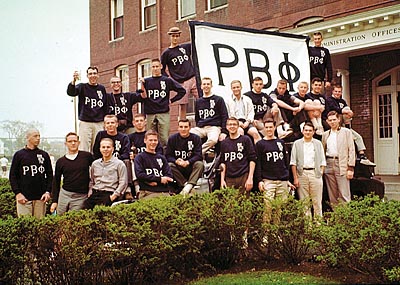Scene Again
At a college where the absence of fraternities has defined student life, what are we to make of the existence of the early-1960s mock fraternity Rho Beta Phi (“Roger Bill Fraternity”)?

Maybe we need to know what the Roger Bill buddies were mocking.
Perhaps the administration, occupiers of the Bill’s first floor until Lane Hall opened in July 1964. By the early ’60s, the jousting between students and decision-makers over social mores had begun. According to a contemporary Bates Student poll, for example, students believed that restrictive blue-slip policies were being used to quash small coed gatherings — and the chance that students might have sex.
Maybe Rho Beta Phi merely reflected a Bates era rife with subversive hijinks. A mild example was the sign posted outside the Chapel doors one morning: “We Give S&H Green Stamps.”
In this spring 1961 photo, RBPers pose on and around “the Hearse,” the Billmobile that once carried kegs and coeds to a local drive-in. “Hearses can carry a lot of weight,” explains John Meyn ’64. The evening’s short subject was when the boys mooned fellow moviegoers from atop the vehicle.
RBP arose spontaneously, the result of late-night bull sessions among close friends. Tight quarters in a small residence also helped to create a primordial setting for the mock fraternity’s genesis. (On the second floor alone, 28 Bill men shared one urinal, two sinks, two toilets, and one metal shower stall.)
Famous as a different-drummer dorm before and after this era, the Bill and its denizens firmly coalesced around the RBP banner as “the identity of close-knit Roger Bill friends, with no higher meaning,” says Meyn, who’s standing, third from right, in the photo.
The friends were “fun-loving, mischievous comrades — certainly,” says Richard Crocker ’64, the sign-holder who’s wearing a hat in the photo.
There were rivalries with JB and Parker, complete with a Clay-vs.-Liston bout fought by Siamese fighting fish. There was a sanctioned RBP dance, the kidnapping of the popcorn machine from the Den, and the ice blockade of Bardwell Street, then a city lane passing in front of the Bill.
As the Bill ends its life as a residence and becomes academic space (see page 8), its legacy involves more than storied stunts. Fraternal friendship is what’s real and present among RBPers, says Crocker. Mere memories, he muses, can prove ambiguous. “Where do the paths of nostalgia and fantasy cross?”